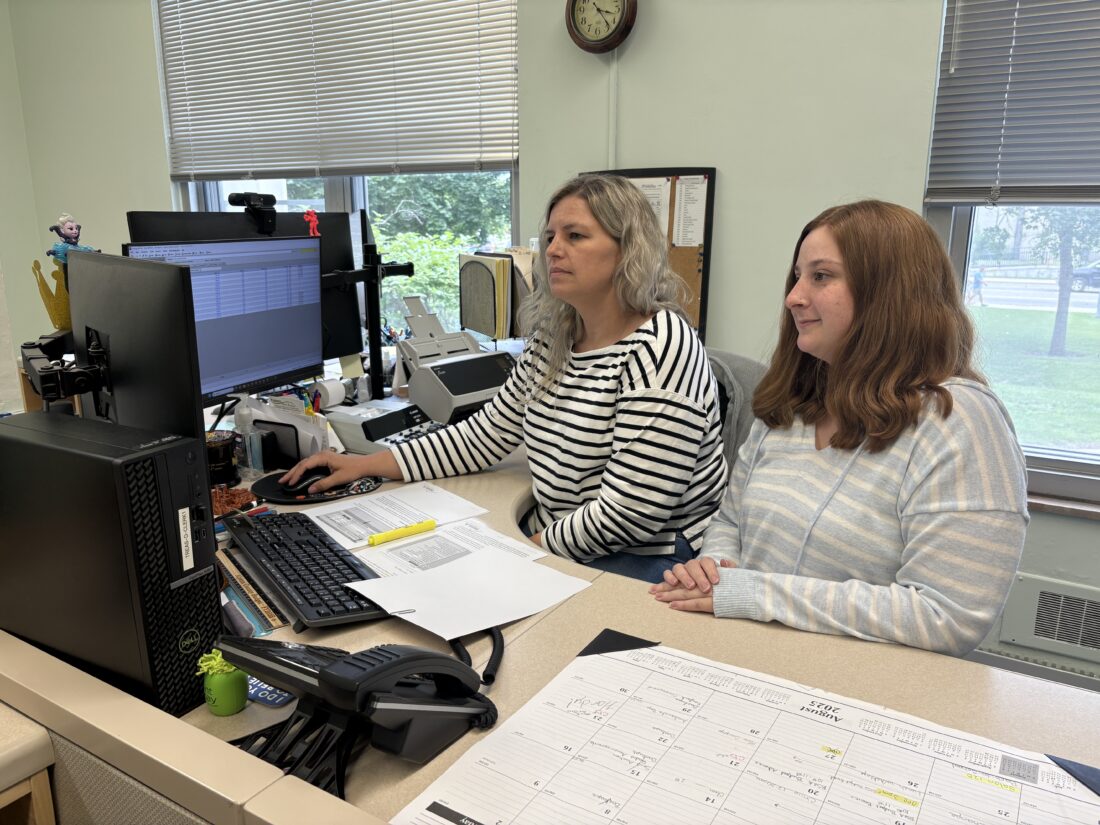State cuts could impact local government finances

News Photo by Steve Schulwitz Chief Deputy Treasurer Amanda Repke, left, and treasurer’s office employee Rikki Nadeau work together on a computer on Wednesday at the Alpena County Courthouse.
ALPENA — Counties, townships, and cities stand to lose critical revenue from the state if the budget passed on Tuesday in the House finds its way to the desk and is signed by Governor Gretchen Whitmer.
The proposed budget, which still needs approval from the state Senate, calls for a $40 million cut and could impact services for municipalities that already face budgetary difficulties.
State Representative Cam Cavitt, R-Cheboygan, voted for the proposed budget, as did all of his Republican counterparts. The lone Democrat to vote in favor of the budget was State Rep. Karen Whitsett of Detroit.
Cavitt said there are a lot of good things in the budget, such as no tax on tips, overtime, and Social Security, and it also forces state workers who are still working remotely to return to the office. He said there is also a large increase in funding for roads, which will go directly to local road commissioners and not to the Michigan Department of Transportation.
Cavitt said although the budget passed the House, there will likely be changes to it after a budget from the Democrat-controlled Senate is introduced.
“Typically, things get cut down to the studs and then things are added during negotiations,” Cavitt said. “This is really just a starting point and the beginning.”
According to Stephan Currie, executive director for the Michigan Association of Counties, the proposed cut would lower the amount of revenue sharing municipalities receive by 12%. He said that would be a large blow to the revenue side of budgets and likely force counties to make cuts, while still meeting all of the state mandates that are in place.
“You can’t suddenly adopt a 12-percent reduction in county revenue sharing, require minimum funding levels and walk away expecting everything will turn out fine,” Currie said in a press release. “County commissioners are elected to make local investment decisions in their communities. The Michigan Association of Counties has long argued for more investments in our chronically underfunded road grid, trying to raise those funds by slashing state dollars that counties use to operate everything from courts to health departments is robbing Peter to pay Paul.”
Cavitt said the proposed House budget includes $112 million in the Public Safety and Prevention Fund, which will increase allocations to local police. He said police departments are often a large strain on local budgets and added revenue for them could ease some of the financial burdens from the revenue sharing cuts, if indeed they become a reality.
The impact of the proposed cuts to revenue sharing will have a different impact on each municipality.
Montmorency County Controller Aprille Williamson said it is never good when state revenue sharing is cut and expects to lose about $33,000 if the proposed budget becomes a reality. But, at least in the short term, the county is solid financially, thanks to a budget surplus and savings that equate to about 40% of budgeted expenses. Williamson said the county has had most of its expenses from its ice storm response reimbursed, so that also saved money.
“Our budget surplus is about $80,000, so we could handle it right now and we’re kind of sitting pretty,” she said. “We should be OK for this year and for next year, we’ll just have to wait and see.”
Alpena County is in the process of digging itself out of a $1.4 million budget deficit and has made large gains by utilizing a portion of its fund balance, stimulus money from the America Rescue Plan Act, funds it acquired from the opiate lawsuit, and money from the tax revolving fund.
Still, any loss of revenue could make balancing a budget more difficult and cause the county to lose at least a portion of the ground it made up.
Alpena County Administrator Jesse Osmer said the county is facing a cut of about $115,000 and the loss of revenue would be unfortunate. He added that he remains hopeful the revenue sharing funds will be fully restored as both the House and Senate negotiate.
“The fact of the matter is, a 12% cut in county revenue sharing would be damning to local units of government, but I believe the House knows this, so I think the idea it makes it through conference is unlikely,” Osmer said. “The House has traditionally begun their process bare bones, while the Senate and Governor tend to begin with drapes and all. We can only hope that as the process works itself out, we’ll see a more reasonable appropriations bill develop; hopefully one that includes adequate support for counties. I’ve been in touch with Representative Cavitt, we had a great conversation, and we’ll continue to stay in touch throughout the appropriation process.”
Alpena City Manager Rachel Smolinski said state revenue makes up about 13% of the annual budget, which runs from July 1 through June 30. She said the city has seen an increase in revenue sharing over the last several years, which has helped finances.
Smolinski said the city is expecting to receive about $1.5 million in state revenue sharing funds this fiscal year and she is unsure what future budget years will look like if revenue is cut. She said she is hopeful the House, Senate, and governor can reach an agreement that keeps the revenue sharing consistent.
“Obviouslty, there would be an impact, but we will work with the Michigan Municipal League, who has been working on this, and see how this plays out,” she said. “Right now, nothing is finalized and we’re not sure what the total impact would be, if there is one.”
The Alcona County Treasurer said she had not been notified by the state and not aware of the proposed cuts to the county and declined comment until she learned more about them.
A message was also left with Presque Isle County Treasurer Valerie Peacock seeking comment on the proposed cuts.
The state government has until Oct. 1 to adopt a new budget or a government shutdown would be implemented until a budget deal is reached.
Steve Schulwitz can be reached at 989-358-5689 or sschulwitz@TheAlpenaNews.com. Follow him on X @ss_alpenanews.com.




